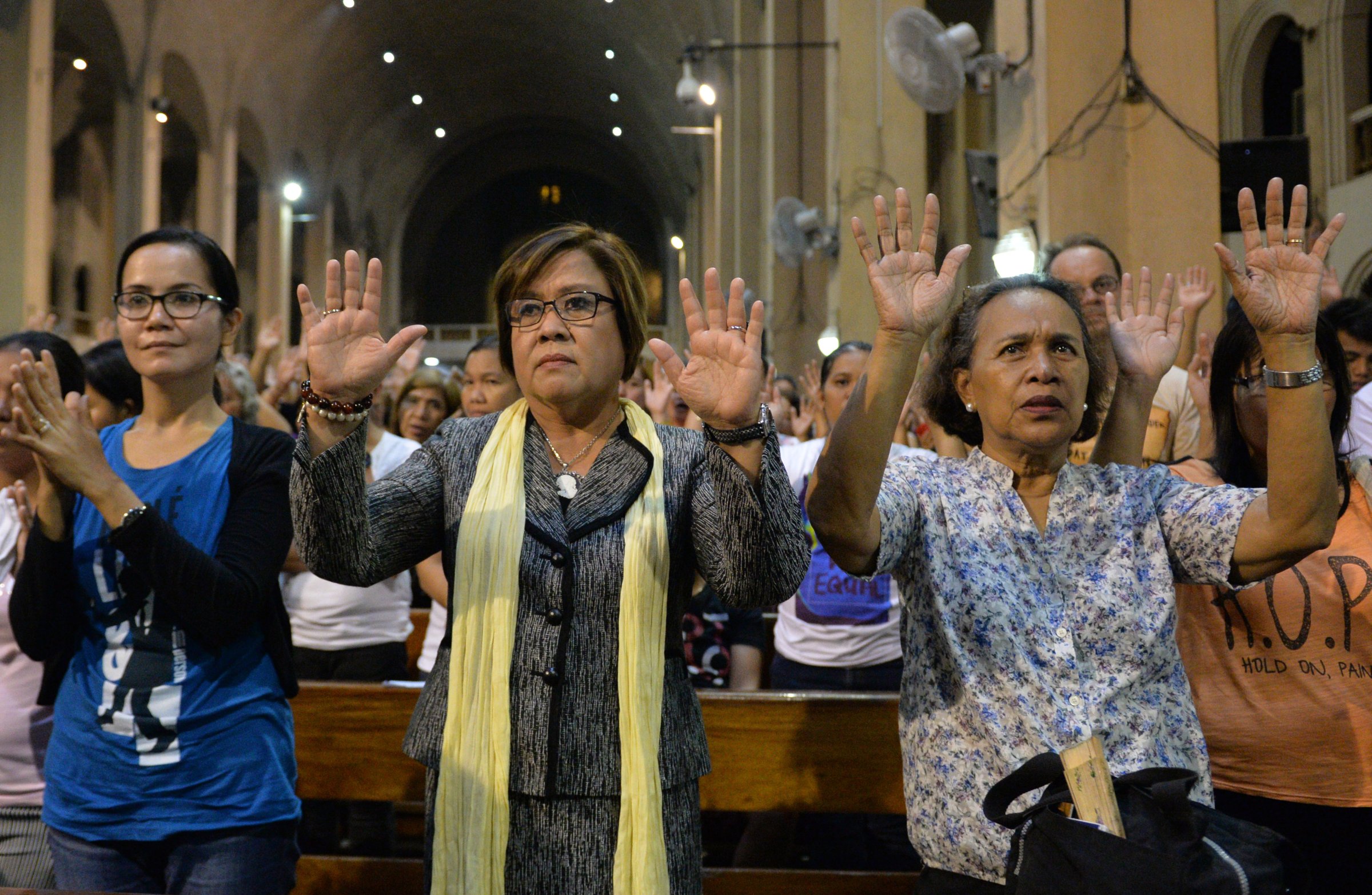
It’s Christmastime in the Philippines. As is the case with most former Spanish colonies, the country is thoroughly Catholic, and celebrates the holiday with an endearing earnestness. Green and red lights have hung along the boulevards of Manila since late September. Above the front doors of the headquarters of the city’s police force, a string of off-white light has been twisted to spell the words “Peace on Earth.” Traffic is even worse than usual, particularly on the highway that connects Ninoy Aquino International Airport with the city: many of the 10 million Filipinos forced to find work overseas — as maids, as waitresses, as fitness instructors — have come home for the holidays.
In the headquarters of the Senate of the Philippines, lawmakers have made a show of decorating the doorways to their offices. The building itself is squat and brutalist, and the low ceilings and fluorescent lights of its hallways give off an unfortunate bureaucratic feel, but the decorations at least bring some color. They’re mostly orthodox — ropes of garland; wreaths ensconcing nativity scenes — except for one threshold, which has instead been bordered with off-white tinsel and elegant gold baubles.
This is the office of Senator Leila de Lima, and on the afternoon of Dec. 7, she is inside at her desk, exhausted but mostly unfazed. She is 57, with a neatly short haircut and a good taste in silk scarves. She wants you to know that this is a country at war. It’s hard to see it, because this is a war that happens only at night. Since President Rodrigo Duterte was elected in May, nearly 6,000 people have died in what has been called his “war on drugs,” an extrajudicial and largely arbitrary campaign to utterly expunge the Philippines’ addicts and dealers. The toll is now on par with that inflicted last year by Boko Haram in Nigeria.
“These are death squads,” de Lima says simply, referring to the vigilantes that gun down suspected drug users in the streets, or sometimes in their homes.
Outside of de Lima’s private office there is a bullpen-type operation where her staff — made up of young, enthusiastic types — buzzes about, but in here it’s quiet and sparse. She has her own nativity scene set up on a far table; on her desk, beneath the seal of the Philippine Senate, documents concerning the Senate’s own inquisition into her alleged corruption have been meticulously stacked. She pays them no mind.
De Lima, who previously served as the Philippines’ Secretary of Justice and chaired the country’s Commission on Human Rights, was elected to the Senate in May, on the same day that the 71-year-old Duterte won in a near landslide. Since taking office in June, she has committed herself to standing up to him and fighting the war on drugs in the country’s highest corridors of power. She is practically the only Philippine politician that does so.
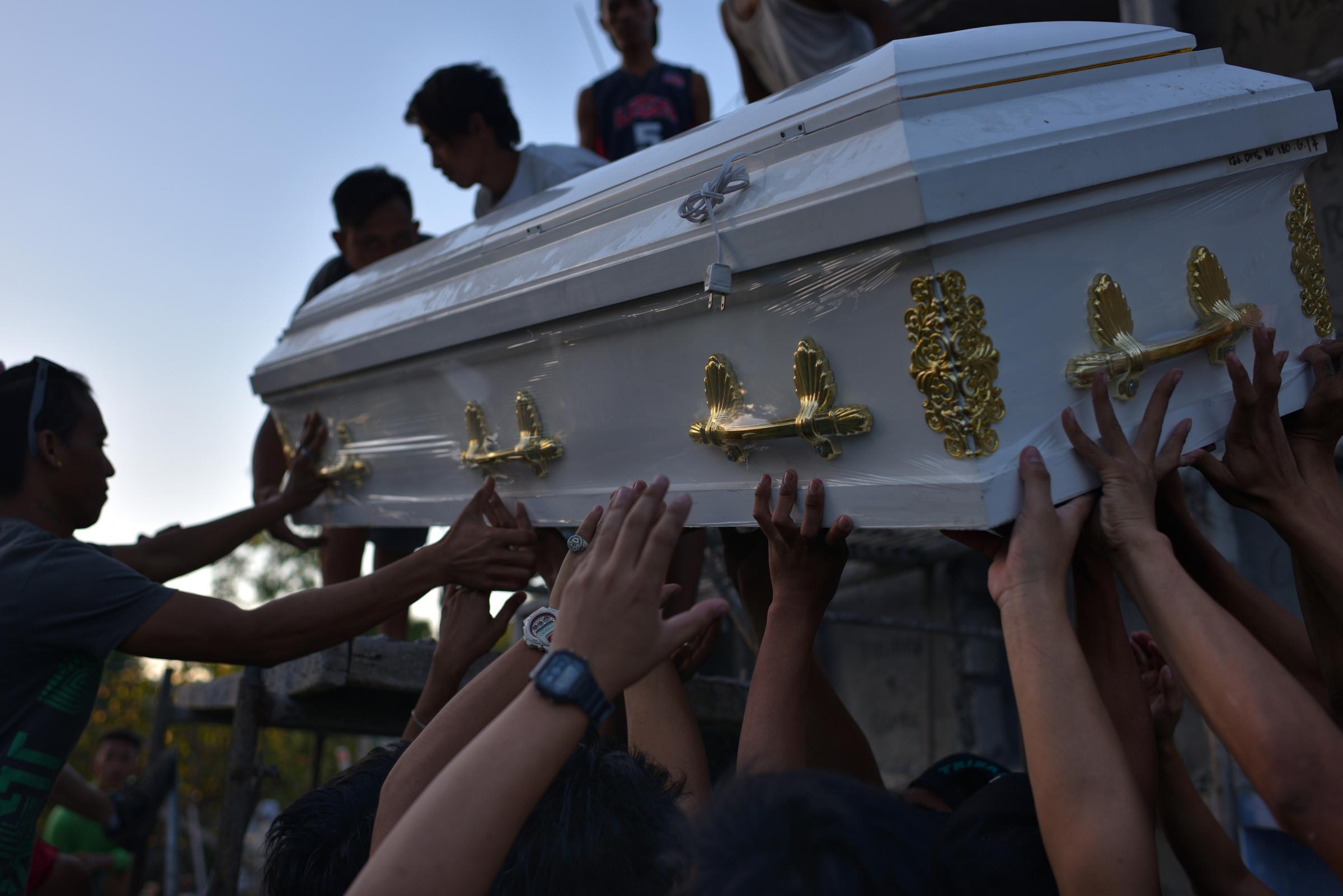
Hers has been a grisly, largely futile battle. Duterte, who made his political name as the foul-mouthed mayor who cleaned up the southern city of Davao — once the country’s murder capital — is wildly popular in the Philippines. (At last polling, his approval rating stood at 76%.) Global historians will remember this decade as the epoch that gave political legitimacy to contrarianism: Duterte, like Donald Trump in the U.S., appealed to voters because he was a walking refutation of an establishment they were disillusioned with, promising to restore order to the streets and luster to the national image.
His popularity extends to the country’s legislature, where a rabid coalition of lawmakers has set out to impede de Lima’s pursuit of justice and tarnish her image in the process. In September, she was ousted as the chairwoman of the Senate’s Justice and Human Rights Committee, which, under her, had been tenaciously investigating the drug war’s extrajudicial killings. Weeks earlier, Duterte himself publicly accused de Lima of covertly benefiting from a drug operation inside a Manila prison, and of having a sordid love affair with her driver, whom Duterte said had acted as her accomplice. He also crowed that he had a sex tape of the two of them that made him “lose his appetite.” On Aug. 29, before a rally of his supporters, he encouraged de Lima to “hang herself.”
“All of this — the slut shaming, the threats — it’s unprecedented. No one has ever been subjected to this by a sitting President,” de Lima says. “And it’s all fabricated. They’re doing it to discredit me, to embarrass me, to humiliate me, to vilify me — really portray me as an immoral, bad woman so that people will not listen to me anymore.”
Except that people are listening, for better or for worse. In a country with a capacious media diet and an insatiable appetite for scandal, she is now one of the most notable and polarizing players in the drug war. A search for her name on Facebook on Dec. 13 revealed that nearly 100,000 different users were talking about her at that moment. She had just arrived in Washington, where Foreign Policy was celebrating her as one of the year’s top “Global Thinkers,” for “standing up to an extremist leader.” The same day, back home, Duterte’s allies in Congress had filed a criminal complaint against her for “disrespecting” the legislature.
“Delima and other oligarchs who want DUTERTE ousted we are watching you,” one Facebook user wrote. “You will not succeed whatever your EVIL plans are.”
More to lose
She will tell you that she never wanted this for herself. She’s talking about politics, and its attendant theatrics. But this is a country where the unlikeliest figures end up in positions of authority — Manny Pacquiao, the 37-year-old Filipino boxer who lost to Floyd Mayweather in a heavily watched fight in 2015, was the Senator who worked to remove de Lima from the drug-war investigation — so in any event she’s in good company.
“My father’s advice was to avoid joining politics if I could,” she says. “He said that my personality wasn’t suited for it — that I might just get hurt, because I don’t know how to play games.”
She idolized her father Vicente, a prominent lawyer who went on to lead the Philippines’ federal election-regulation commission. She was born in Iriga, a small city about 10 hours by car south of Manila, in August 1957. Like most of its neighbors in Southeast Asia, the Philippines was, at the time, a young country, fresh from the yoke of colonialism and vulnerable to flux. De Lima had just turned 8 when Ferdinand Marcos, a populist Senator and self-described war hero, was elected President in 1965, beginning a 20-year kleptocratic dictatorship that saw the imprisonment of tens of thousands of “dissidents,” the theft of up to $10 billion from the national coffers — a loss from which the impoverished nation has yet to recover — and the emergence of a national habit of extrajudicial killings. (Duterte has repeatedly praised Marcos and last month had him buried in Manila’s Heroes’ Cemetery.)
De Lima wasn’t particularly political in her youth, but she was an exemplary student, largely because her father (a “strict disciplinarian,” she says) would buy sets of encyclopedias and force her to pore over them. When she wasn’t in school, she tagged along with her father to court and worked as “sort of his unofficial clerk” at his office. By adolescence she was reading Supreme Court judgments for fun.
“I was bound to be a lawyer,” she says. “I had no other ambition in life, even as a child.”
She graduated from a local Catholic high school (as valedictorian, she’ll remind you), then the nationally prestigious De La Salle University in Manila, and went to law school at San Beda College, where Duterte had been a student just over a decade prior. (He happily claims to have shot a fellow student while he was there.) De Lima’s professors remember her as an aggressive, fiercely bright student. At San Beda, she fell in love and married a classmate, Plaridel Bohol.
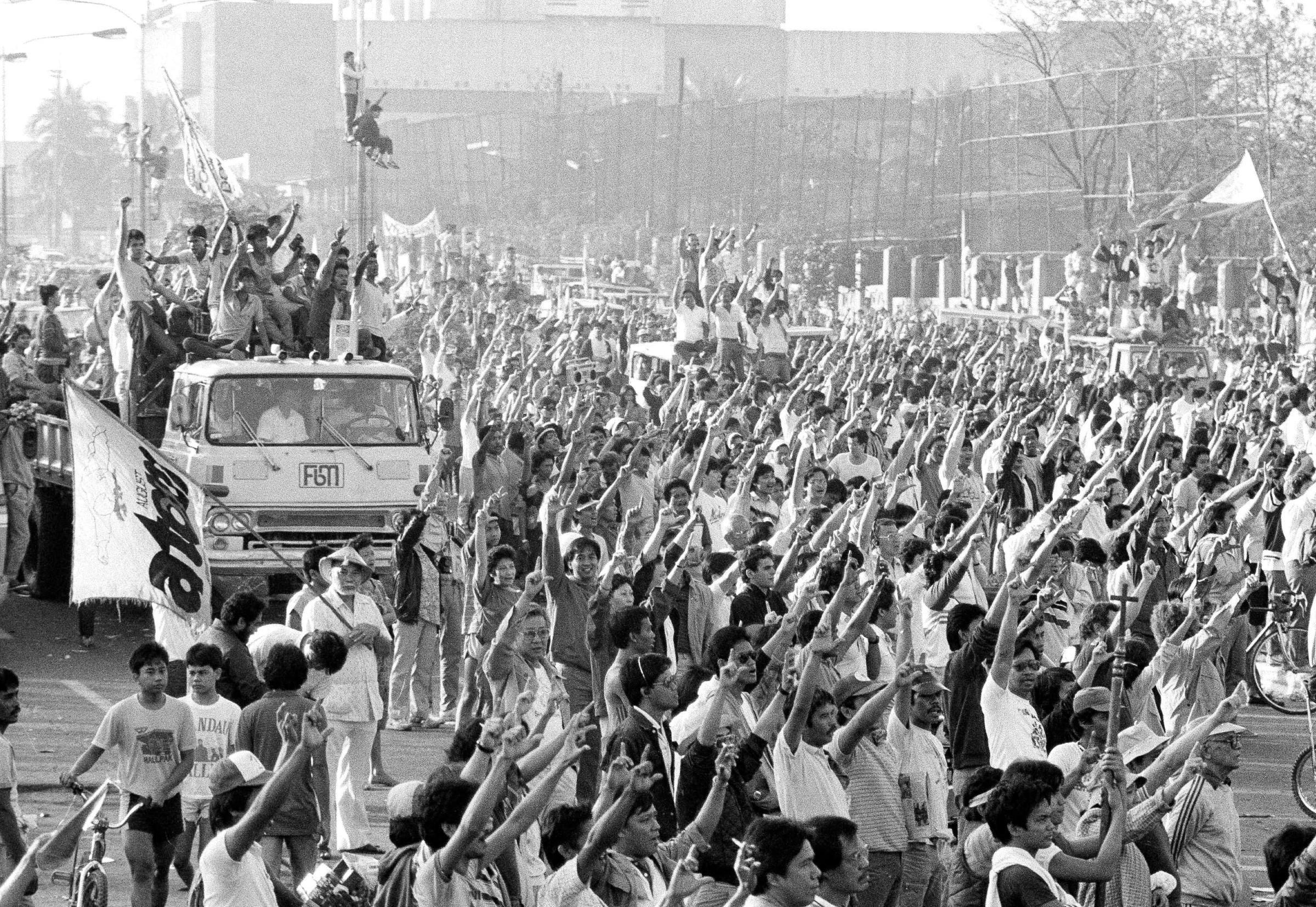
This was the early 1980s. The country was on the precipice of seismic change. In 1983, two summers before De Lima graduated from San Beda, the prominent opposition leader Benigno “Ninoy” Aquino Jr. had been assassinated while disembarking from a commercial flight at Manila International Airport, triggering waves of political unrest and economic instability. Perhaps aptly, the biggest song in Manila those days was “More to Lose” by an otherwise unknown British New Wave duo called Seona Dancing, whose singer, the then 23-year-old Ricky Gervais, would go onto create and star in The Office.
De Lima was waiting for her bar exam results when the Marcos regime finally fell in February 1986. The People Power Revolution, as it was called, was peaceful — under U.S. pressure, Marcos went into exile following a democratic election — and instilled young Filipinos like de Lima with optimism for a liberal future. Corazon “Cory” Aquino, Benigno Aquino’s widow, became President and renamed Manila’s airport for her husband. De Lima got her bar-exam results back; she received the eighth-highest score in all of the Philippines.
She went to work for a prominent Supreme Court Justice, Isagani A. Cruz, but left in the early 1990s to pursue election law at the behest of several mentors. It was a relatively young practice — dictatorships tend to present few opportunities for election litigation — and thus small; de Lima was one of its only women.
“She was very, very good,” says Sixto Brillantes, who taught de Lima at San Beda and later practiced with her. “We were the elders in the practice, then she came in and made it difficult for us, because she spent all her time studying and researching the law — and taking all the clients!”
Over the course of a decade and a half, she took on a number of high-profile cases and clients, including several who have now deemed it politically expedient to attack her amid the ongoing smear campaign. She did this until May 2008, when she was contacted by President Gloria Macapagal Arroyo, who asked her to chair the country’s Commission on Human Rights.
“It was quite an unexpected turn of events, and never part of my career path,” de Lima says. “I thought I would be an election lawyer for life. I wasn’t sure why [Arroyo] did it, but I took it as a challenge.”
The month before her appointment, Philip Alston, a human-rights official at the U.N., published a scathing 65-page report on the country’s apparent epidemic of extrajudicial killings. It mostly concerned the murder of activists, but one page was devoted to the southern city of Davao, describing “the shocking predictability with which criminals, gang members, and street children are extrajudicially executed” there.
“The mayor is an authoritarian populist who has held office, aside from a brief stint as a Congressman, since 1988,” the report read. “When we spoke, he insisted that he controls the army and the police, saying, ‘The buck stops here.’”
That mayor’s name was Rodrigo Duterte. De Lima had never heard of him, but quickly did her research. “He was a colorful figure — who was sort of different,” she says, a conscious understatement. During his tenure as mayor of Davao, Duterte had enforced his anticrime agenda in ways that bordered on pathological: he admits to personally killing suspected criminals; beating them; even threatening to strip speeding motorists naked and parade them through town. Davao’s tourism board called it “the most peaceful city in Southeast Asia.”
The reports of extrajudicial killings troubled de Lima, so she assembled a commission of five and spent several months traveling to and from Davao, about an 80-minute flight from Manila. They held public inquiry sessions in hotel function rooms where they questioned witnesses. At one, they subpoenaed Duterte himself.
“I chastised him publicly during that session, and he was rather meek,” de Lima says. “He did not react violently. He was just looking at me. I was the one raising my voice at him in front of those people.”
“He has not forgotten that,” she says. “He has not forgiven me.”
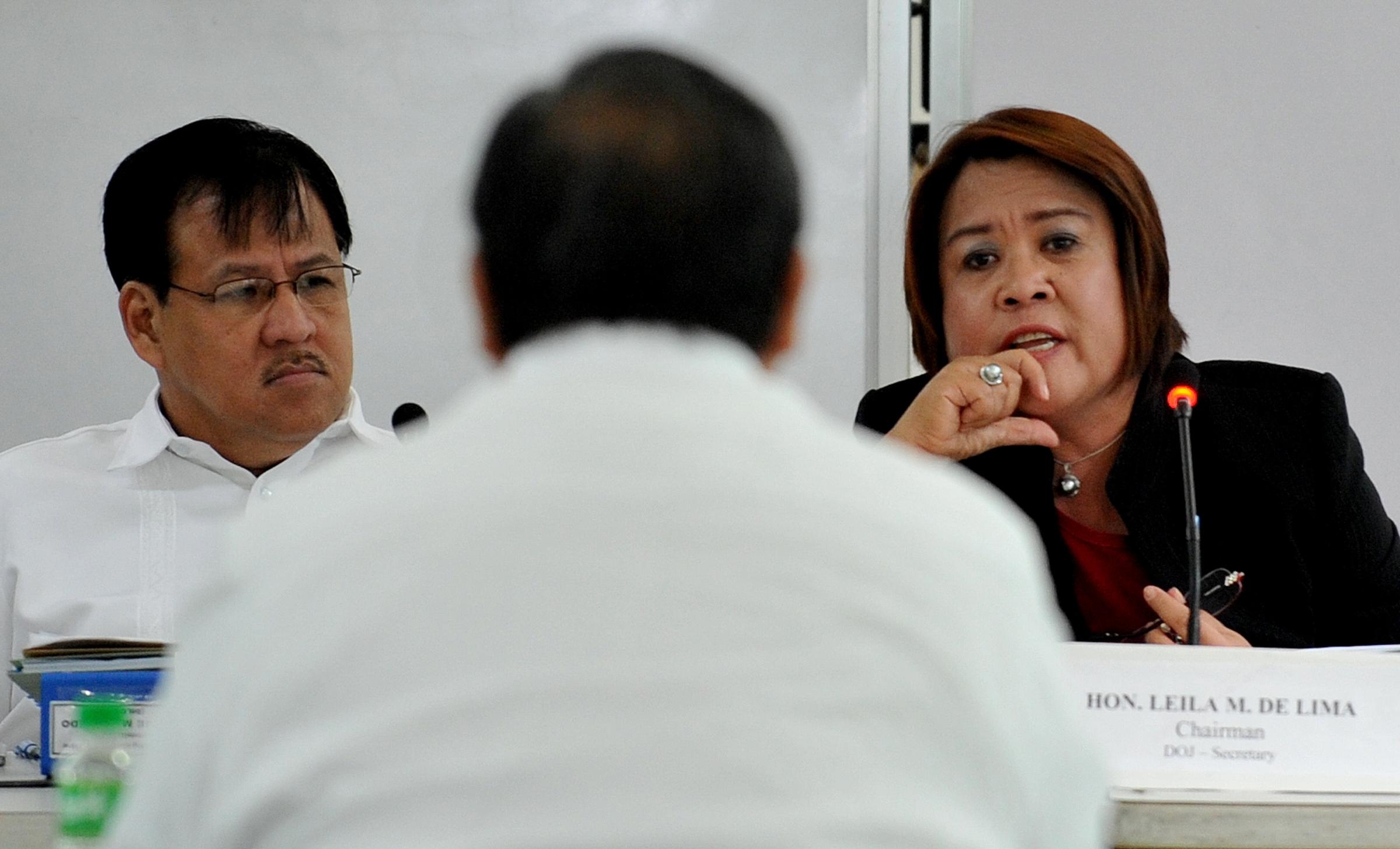
In 2010, de Lima’s tenacity earned the attention of President-elect Benigno “Noynoy” Aquino III, the son of Ninoy and Cory, who invited her to his house and offered her the position of Secretary of Justice on the spot. It was a job that kept her busy: within two months of her taking office, a group of Hong Kong tourists in Manila were taken hostage on their tour bus by a disgruntled ex-cop, and eight of them were killed.
Many of the cases were sensitive, and Aquino asked de Lima if she had security detail. She had first enlisted Ronnie Dayan as her driver and bodyguard in 2007, when she was in private practice. At that point, she says, her marriage to Bohol had been over for six years. She found herself in Dayan’s company more often than not, and within months, she says, “things jut happened.”
“I just fell for him,” she laughs. “I trusted him. I loved him. Love is love.”
He ended up staying with her at her home in Manila during the workweek, which permitted discretion. The relationship, which would come back to haunt her, lasted seven years until 2014, at which point she broke it off, because he was “becoming rather big-headed. I just ran out of love.”
Meanwhile, President Aquino was encouraging her to run in the 2016 Senate elections. “I figured I could best advocate for my core issues — human rights and justice — through legislation,” she says. She was narrowly elected in May, but national attention was turned to a bigger contest — the presidential election, which in terms of discourse was being monopolized by Rodrigo Duterte.
Duterte ran on his reputation as a vigilante mayor, pledging to kill “100,000 criminals” if he won. Crowds ate it up. The Western press wrung its hands over his crass comments about Pope Francis (whom Duterte called “a son of a whore”) and sexual violence (“I should have been first [to rape her],” he said of an Australian missionary, Jacqueline Hamill, who was gang-raped and killed during a 1989 prison riot in Davao), but voters didn’t care. The Philippines, they felt, was at its nadir. The country’s homicide rate was the highest in Asia in 2013; the trade and consumption of methamphetamine — shabu, in local parlance — was booming. As a result, the tourism industry, which employs 1 in 10 Filipinos and makes up 7.8% of the national gross domestic product, was suffering. Duterte, they believed, was going to fix this.
‘Leila is also a fighter. She always has been’
Duterte took office at the end of June; the killings began promptly. According to some estimates, 1,400 people were killed in the first three months. Prisons were past capacity; inmates literally slept on top of each other. De Lima knew this was coming. She took office on the same day as Duterte, and 13 days later she introduced a Senate resolution demanding an inquiry into the brutality. “Extrajudicial or summary killing is homicide,” she wrote plainly. “If left unabated and unchecked, [it] can escalate into a crime against humanity under international law.”
Duterte was quick to go on the defensive, and so were his many supporters, both on the streets and in Congress. On Aug. 17, the President came forward with a damning accusation: during her tenure as Justice Secretary, de Lima had allowed the drug trade at the New Bilibud Prison, a maximum-security facility in metropolitan Manila, to flourish in exchange for campaign donations. He also brought up Dayan.
“Her driver,” Duterte said, “was her lover. He was the one who was also collecting the [illegal] money for her during the campaign.”
“Love Affair Led to Corruption,” crowed one headline in the pro-Duterte Manila Times. In the comments section of the online article, one reader wrote, “Duterte, you are a breath of fresh air, in an otherwise stinking world of authority and corruption.”
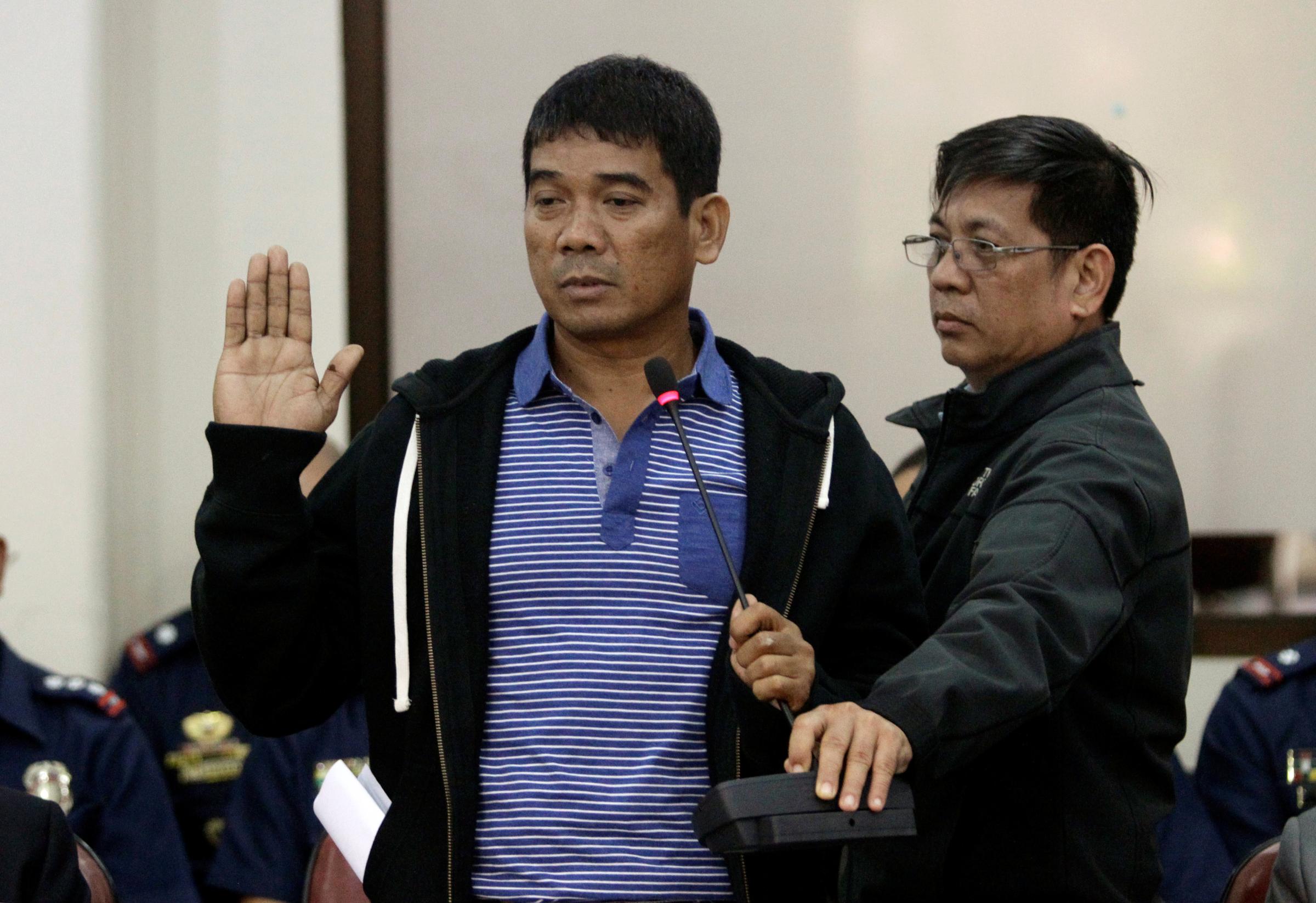
“This is a total lie,” de Lima tells me. “Lightning can strike me right now if that is at all true. Not in any capacity was I a coddler, a protector, a beneficiary of the drug trade.”
Less than a month later, de Lima was ousted in the Senate as the chairperson of the committee investigating the drug war. Senator Alan Peter Cayetano, who hails from an established political family and is widely seen as nebbish and opportunistic, stood up in the chamber and damned de Lima for “misleading” the international media. Cayetano had been Duterte’s running mate in the presidential election — in the Philippines, President and Vice President are elected separately; Cayetano finished third — but before that, he had been a legal client of de Lima’s when she was an election lawyer. He declined to be interviewed for this article.
In the months since, the Senate has devolved into a kangaroo court in its investigations into both the drug war and de Lima’s prison scandal. Her phone number and address have been provided to the public. Dayan, her partner of seven years, has begun testifying against her, which she says is a conspiracy. He told lawmakers that he collected money for de Lima from a drug dealer named Kerwin Espinosa, and on Dec. 6, during a session of the Senate, de Lima confronted him.
“I forgive you,” she said. “You are being used to destroy me and I will know in due time who they are.” One week later, a group of Congressmen filed a criminal complaint against her, for “disrespecting” the House of Representatives.
Brillantes, the former election official who taught both de Lima and Duterte and remains close to them both, has attempted to forge a détente, to little avail. “I’ve talked to the President — he’s not going to back down,” he says. “It will be very difficult for Leila, because the President is very reckless.”
Then: “But Leila is also a fighter. She always has been.”
De Lima now suspects the demise of her political career, or worse, could be imminent. “The idea of being locked in jail is not far-fetched, especially since the President himself has repeatedly said it,” she says. “And I’ve always been concerned about my safety, but it’s being intensified — we feel we’re being monitored.”
She is somewhat philosophical about all of this. “To be honest, sometimes I think I shouldn’t have run, because I would have been spared all this,” she says. “But if I wasn’t elected, who would be fighting the President?”
More Must-Reads From TIME
- The 100 Most Influential People of 2024
- Coco Gauff Is Playing for Herself Now
- Scenes From Pro-Palestinian Encampments Across U.S. Universities
- 6 Compliments That Land Every Time
- If You're Dating Right Now , You're Brave: Column
- The AI That Could Heal a Divided Internet
- Fallout Is a Brilliant Model for the Future of Video Game Adaptations
- Want Weekly Recs on What to Watch, Read, and More? Sign Up for Worth Your Time
Contact us at letters@time.com